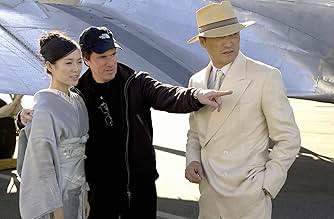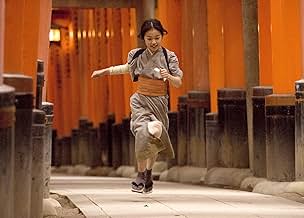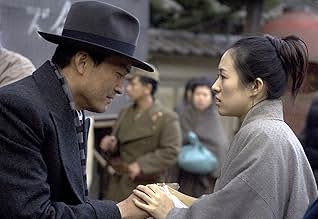Nitta Sayuri revela como ela creceu nas aldeias de pescadores e se tornou uma das gueixas mais famosas do Japão.Nitta Sayuri revela como ela creceu nas aldeias de pescadores e se tornou uma das gueixas mais famosas do Japão.Nitta Sayuri revela como ela creceu nas aldeias de pescadores e se tornou uma das gueixas mais famosas do Japão.
- Ganhou 3 Oscars
- 32 vitórias e 47 indicações no total
- Direção
- Roteiristas
- Elenco e equipe completos
- Produção, bilheteria e muito mais no IMDbPro
Enredo
Você sabia?
- CuriosidadesThe elements of nature are a running theme through this film and each of the four main Geisha have an elemental character. Sayuri is water, Mameha is wind, Pumpkin is wood (the equivalent of earth) and Hatsumomo is fire.
- Erros de gravaçãoWhen Hatsumomo and Pumpkin are leaving on the night of Pumpkin's debut, neither Mother nor Auntie spark flint on their backs. A Geisha would never leave her okiya without this act being performed as it was believed it brought good luck.
- Cenas durante ou pós-créditosNo studio logos are shown at the beginning. They however appear shortened after the end credits and are accompanied by the film's score.
- ConexõesFeatured in The 63rd Annual Golden Globe Awards 2006 (2006)
- Trilhas sonorasAnata No Mono Yo
Written by Takao Saeki and Kouka Sassa
Performed by Noriko Awaya
Courtesy of Columbia Music Entertainment, Inc.
Avaliação em destaque
Looking over previous comments here, it is clear that this is a very polarizing movie experience, one that seems to put "Syriana" to shame in that realm. Director Rob Marshall has taken a best selling novel and turned out a feature film that it appears some people love and some absolutely hate. Count me in the first category, but allow me to indulge the critics, too.
First, this isn't a typical Hollywood film. Despite popular western misconceptions about Geishas, there's no sex, almost no violence and beyond that, there's nearly two and a half hours of women's problems that many men may find hard to relate to. This is not "Desperate Housewives" or even "All my Children." This is about deceit, treachery and rivalries as much as it is about a little girl who gets sold into bondage by her impoverished Japanese family. Its also about a lifelong search for love in a society in which people apparently can't just step up and make frank declarations of devotion to one another. This movie is in a word "complicated" and that is going to turn some American movie goers off.
But not all Asian film fans are raving about this movie either, some thinking it is a very superficial look at Japnese customs and others incensed that a movie that's about an important Japanese tradition should star three Chinese actresses. I cannot comment on either topic, since I know little or nothing about Japanese tradition and I don't know why Ziyi Zhang, Michelle Yoeh and Gong Li were cast. They have been seen before by American audiences, but are hardly film stars in this country, so it wasn't as if they were going to draw in tons of fans on their names alone.
The only thing I can think of is, all three are fine actresses and they more than proved that in this film. If Gong Li does not get a best supporting actress nomination, there's no justice. And Zhang should probably get a crack at best actress for her work, as well.
All three just light up the screen.
But, I can understand in this age of political correctness, how some would be offended by the casting and how others might complain about the handling of the Japanese subject matter.
All I can say is, movie makers face trade offs and one is either targeting your film to a mass audience (and in America, that means a generally poorly educated audience) or "narrow casting" your film to people very well acquainted with the topic who will swoop down on any flaw. But that, when dealing with a topic like Japanese geisha culture, is a pretty small audience in America, too small to generate the kind of box office a film like this needs to pull in to pay for itself. From a purely Anglo, American, unschooled in Japanese culture standpoint, I think Marshall made good decisions. I hope he has not slighted Japanese culture too much, but I think he has made a suspenseful, captivating, enchanting film that does something a lot of films haven't in recent years.
He gave us a complex central character we can pull for throughout the film and for that, I thank him.
"Memoirs of a Geisha" ranks among my five best films of the year thus far, and deserves a best picture nomination.
First, this isn't a typical Hollywood film. Despite popular western misconceptions about Geishas, there's no sex, almost no violence and beyond that, there's nearly two and a half hours of women's problems that many men may find hard to relate to. This is not "Desperate Housewives" or even "All my Children." This is about deceit, treachery and rivalries as much as it is about a little girl who gets sold into bondage by her impoverished Japanese family. Its also about a lifelong search for love in a society in which people apparently can't just step up and make frank declarations of devotion to one another. This movie is in a word "complicated" and that is going to turn some American movie goers off.
But not all Asian film fans are raving about this movie either, some thinking it is a very superficial look at Japnese customs and others incensed that a movie that's about an important Japanese tradition should star three Chinese actresses. I cannot comment on either topic, since I know little or nothing about Japanese tradition and I don't know why Ziyi Zhang, Michelle Yoeh and Gong Li were cast. They have been seen before by American audiences, but are hardly film stars in this country, so it wasn't as if they were going to draw in tons of fans on their names alone.
The only thing I can think of is, all three are fine actresses and they more than proved that in this film. If Gong Li does not get a best supporting actress nomination, there's no justice. And Zhang should probably get a crack at best actress for her work, as well.
All three just light up the screen.
But, I can understand in this age of political correctness, how some would be offended by the casting and how others might complain about the handling of the Japanese subject matter.
All I can say is, movie makers face trade offs and one is either targeting your film to a mass audience (and in America, that means a generally poorly educated audience) or "narrow casting" your film to people very well acquainted with the topic who will swoop down on any flaw. But that, when dealing with a topic like Japanese geisha culture, is a pretty small audience in America, too small to generate the kind of box office a film like this needs to pull in to pay for itself. From a purely Anglo, American, unschooled in Japanese culture standpoint, I think Marshall made good decisions. I hope he has not slighted Japanese culture too much, but I think he has made a suspenseful, captivating, enchanting film that does something a lot of films haven't in recent years.
He gave us a complex central character we can pull for throughout the film and for that, I thank him.
"Memoirs of a Geisha" ranks among my five best films of the year thus far, and deserves a best picture nomination.
- Tony43
- 12 de dez. de 2005
- Link permanente
Principais escolhas
Faça login para avaliar e ver a lista de recomendações personalizadas
Detalhes
- Data de lançamento
- País de origem
- Central de atendimento oficial
- Idiomas
- Também conhecido como
- Memoirs of a Geisha
- Locações de filme
- California State Railroad Museum - 111 I Street, Sacramento, Califórnia, EUA(interiors: railroad station)
- Empresas de produção
- Consulte mais créditos da empresa na IMDbPro
Bilheteria
- Orçamento
- US$ 85.000.000 (estimativa)
- Faturamento bruto nos EUA e Canadá
- US$ 57.490.508
- Fim de semana de estreia nos EUA e Canadá
- US$ 682.504
- 11 de dez. de 2005
- Faturamento bruto mundial
- US$ 162.242.962
- Tempo de duração2 horas 25 minutos
- Cor
- Mixagem de som
- Proporção
- 2.39 : 1
Contribua para esta página
Sugerir uma alteração ou adicionar conteúdo ausente







































